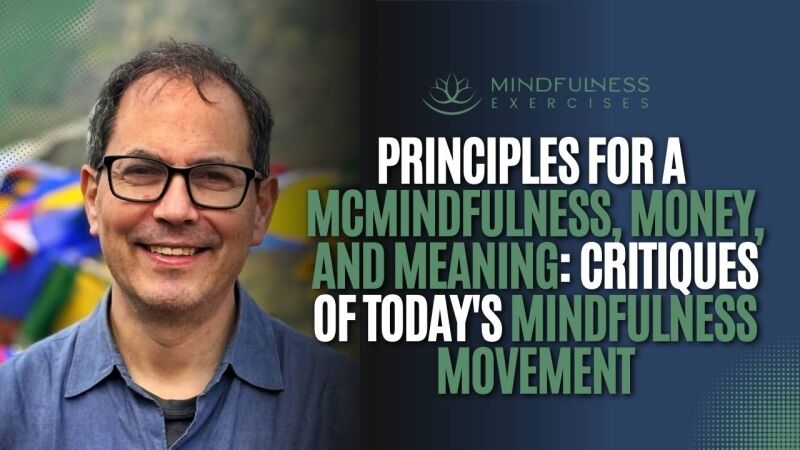Listen now
Mindfulness is more popular than ever. It shows up in conference rooms, military trainings, wellness apps, therapy sessions, and social media feeds. And while there’s tremendous good in seeing more people explore awareness and compassion, there’s also an important conversation happening beneath the surface—one that asks not just how mindfulness is taught, but why.
In this thoughtful episode of the Mindfulness Exercises Podcast, scholar and teacher William Edelglass joins us to explore the growing critiques of the modern mindfulness movement. Together, we look closely at questions of ethics, commercialization, trauma sensitivity, and the tension between personal insight and collective liberation.
This conversation is not anti-mindfulness. If anything, it’s a return to the roots: a reminder that mindfulness is more than a stress-reduction tool. It is a practice embedded in ethics, compassion, accountability, and social responsibility.

Sponsored by our Mindfulness Meditation Teacher Certification Program
MindfulnessExercises.com/Certify
What You’ll Learn in This Episode:
- Why mindfulness can’t be separated from ethics and context
- How commercialization shapes what mindfulness becomes
- Where “McMindfulness” critiques come from
- The difference between instrumental (outcome-driven) mindfulness and transformative practice
- Research on benefits and limits of mindfulness apps and programs
- Why individualizing distress can overlook systemic causes
- How Buddhist ethics can re-ground modern mindfulness
- The importance of trauma-informed teaching and consent
- Practical guidance for teaching mindfulness with integrity
- An invitation to reflect, question, and participate in deeper study
Show Notes:
Beyond Buzzwords: Why Critiques Matter
The episode opens with an honest observation: mindfulness has gone mainstream, but not always in ways that reflect its depth.
William points to the now-famous question from activist Angela Davis:
“What good is mindfulness if it doesn’t help us address injustice?”
This question does not dismiss mindfulness—it expands it. It invites us to consider how awareness can inspire social responsibility rather than quiet avoidance.
What Is “McMindfulness”?
The term “McMindfulness” refers to the mass-market, decontextualized version of mindfulness that focuses on:
- Productivity
- Stress reduction
- Emotional control
- Corporate performance
- Military readiness
…without the ethical foundations that originally shaped the practice.
William explains that when mindfulness is sold as a quick fix or self-optimization tool, it risks losing its heart: compassion, wisdom, and liberation from suffering—not just for individuals, but for communities.
Mindfulness in Apps, Corporations & the Military
Mindfulness apps have introduced millions to meditation—something worth celebrating. Corporate programs have reduced burnout. Military adoption has helped soldiers regulate stress and trauma.
Yet, as William notes, these benefits raise important questions:
- What happens when mindfulness becomes a product?
- Are we teaching presenteeism or genuine presence?
- When organizations adopt mindfulness, are they addressing root causes of harm—or asking individuals to cope with them quietly?
Research shows clear improvements in well-being, emotional regulation, and attention. But research also shows that effectiveness depends on context, guidance, ethics, and teacher skill—not just the technique itself.
The Risk of Individualizing Distress
One of the most pressing critiques is the tendency to frame suffering as a personal problem rather than a systemic one.
For example:
- Anxiety from workplace exploitation
- Burnout from unsustainable workloads
- Stress caused by inequality or discrimination
…can’t be fully healed with meditation alone.
Mindfulness can support resilience, but it cannot replace structural change. William suggests that ethically grounded mindfulness can help us name these systems instead of numbing us to them.
Returning to the Roots: Ethics & Social Responsibility
William makes a crucial point: in the Buddhist tradition, mindfulness is inseparable from ethics.
It is linked to:
- Compassion
- Non-harm
- Truthfulness
- Generosity
- Wise action
- Community care
Mindfulness is not simply paying attention—it’s paying attention in a way that supports awakening, compassion, and integrity.
When we teach or practice outside this ethical frame, we risk turning mindfulness into a tool of avoidance rather than liberation.
Trauma-Informed Mindfulness: Consent & Safety Matter
A growing number of teachers are integrating trauma-sensitive principles, such as:
- Offering choices
- Normalizing movement
- Using invitational language
- Avoiding coercive instructions
- Emphasizing grounding
- Encouraging community support
- Prioritizing psychological safety
This shift is essential in a world where many participants carry trauma, oppression, or chronic stress.
Mindfulness should never be used to push someone toward emotional territory they are not ready to enter.
Teaching Mindfulness with Integrity
Throughout the episode, William offers clear principles for ethical practice and teaching:
1. Provide Context
Teach mindfulness within a framework of ethics, compassion, and interdependence.
2. Encourage Critical Thinking
Invite participants to reflect on why they practice—not just how.
3. Stay Trauma-Informed
Use choice-based, consent-driven, non-coercive approaches.
4. Avoid Overselling
Meditation helps—but it’s not a cure-all.
5. Connect Personal Practice with Social Change
Empower students to see how inner work informs outer action.
6. Foster Community, Not Isolation
Mindfulness is relational, not simply individual.
These principles help protect the practice from commodification and restore its original depth and dignity.
About William Edelglass
William Edelglass is a scholar of Buddhist philosophy and environmental humanities. He serves as the Director of Studies at the Barre Center for Buddhist Studies and has published widely on ethics, mindfulness, and the intersection of contemplative practice and social justice.
His work bridges ancient wisdom with contemporary life, emphasizing clarity, ethical grounding, and compassionate action.
